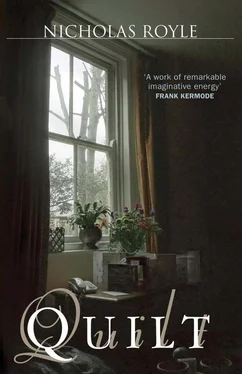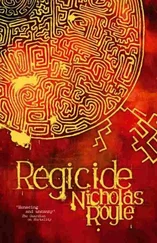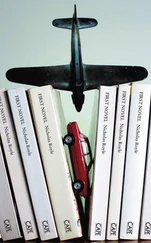Nicholas Royle - Quilt
Здесь есть возможность читать онлайн «Nicholas Royle - Quilt» весь текст электронной книги совершенно бесплатно (целиком полную версию без сокращений). В некоторых случаях можно слушать аудио, скачать через торрент в формате fb2 и присутствует краткое содержание. Год выпуска: 2011, Издательство: Myriad Editions, Жанр: Современная проза, на английском языке. Описание произведения, (предисловие) а так же отзывы посетителей доступны на портале библиотеки ЛибКат.
- Название:Quilt
- Автор:
- Издательство:Myriad Editions
- Жанр:
- Год:2011
- ISBN:нет данных
- Рейтинг книги:4 / 5. Голосов: 1
-
Избранное:Добавить в избранное
- Отзывы:
-
Ваша оценка:
- 80
- 1
- 2
- 3
- 4
- 5
Quilt: краткое содержание, описание и аннотация
Предлагаем к чтению аннотацию, описание, краткое содержание или предисловие (зависит от того, что написал сам автор книги «Quilt»). Если вы не нашли необходимую информацию о книге — напишите в комментариях, мы постараемся отыскать её.
Quilt — читать онлайн бесплатно полную книгу (весь текст) целиком
Ниже представлен текст книги, разбитый по страницам. Система сохранения места последней прочитанной страницы, позволяет с удобством читать онлайн бесплатно книгу «Quilt», без необходимости каждый раз заново искать на чём Вы остановились. Поставьте закладку, и сможете в любой момент перейти на страницу, на которой закончили чтение.
Интервал:
Закладка:

Early next morning you call. I am angry and worried in ways I think it best not to voice. I let you do the talking. You apologise. You tell me you had to stop writing, because the café was closing. And when you got back to the house you were suddenly overwhelmed with an incredible tiredness, as if you hadn’t slept for weeks. Omitting even to feed the rays you fell into a sleep as deep as a coma and have only just come to. You say you thought it was in your head, or the estate agent stolen back into the house and playing a trick on you, improbably hiding in your parents’ bathroom and producing a top-class imitation of your mother’s screech. But how did he know how to imitate her? No: there was no one in the bathroom. The door was closed and you couldn’t open it. Not locked, just a window you’d left open had blown the door shut and now the wind was blowing a gale through, keeping the door as if stuck fast and whistling up a sound like a mad fugue, you say, a horrible frenzied feeling subsiding as you heard the screech fade and found the door could, after all, be opened quite easily and the bathroom empty, a site of harmless ruin and cobwebs enlivened by breezes. But then in a state, you say, of high but bleary relief you went downstairs and your mother was sitting at the kitchen table, fresh as reality, puffing on a cigarette, sipping at her coffee, fiddling with the Times crossword, quizzing you about your father and asking did you want any shopping as she was planning to drive down to the town. You asked about her Alzheimer’s, you say, and suddenly realised you’d never used the word to her face. It was mortifying. You say you were frozen rigid at first but then went closer. You thought you were in Madame Tussaud’s. When you first saw her, you admit, it was unpleasant to say the least, like a huge wave of something staggeringly malodorous washing in from the sea. Not this, you thought. You couldn’t move. You were stranded at the open kitchen door in a trance, rigid, and would have called me, an ambulance, a neighbour, but so many things seemed to be happening at once. It wasn’t just your mother sitting calm as the moon, it was like curtains pulled back very sharply, to expose another veil, one giving way to the next. It was when I said the word ‘Alzheimer’s’, you say.
You were seeing things, you see that. You frame a reconstruction: you’re hallucinating, had a funny turn coming back into the house, big day, big decision to sell the place, things perhaps all too quick, calling in the estate agent straight away and his speed taking the pictures, falling through the ladder, getting the sale rolling, as he said, with luck find you a buyer before we even have the brochure printed.
— It’s the word ‘Alzheimer’s’. Its very anachronicity produces the future it traces. Do you think I’m crazy? The moment I say it my mother looks at me, her soul collaborator, innocent little girl’s blue eyes she had even when she had completely lost the plot, but looking at me now in complete possession of her senses, entirely derailed by my use of this word, as if I have made a mortally serious mistake and something is being ripped, carefully but very fast, from the top of my brain. I say Yes, I see, Mother, it’s not your word, and I’m in tears now and scarcely conscious but we’re standing embracing one another, and then I’m lying on the floor. I have wet myself and my mouth is full of the taste of blood. I’ve bitten my tongue, I realise, coming round, and I see no sign of her or of the paper, the coffee mug, cigarettes or ashtray, not even a whiff of tobacco smoke remaining. I take a shower and feel cold, as if I’m dead myself, like Clarence: as if I were drowned.

Sometimes in a pool you can see one ray has sort of sidled up along the substrate and come down on another, sort of half-covering her. There’s nothing sexual about it per se . It’s like you can’t tell if they’re even aware of it. I remember when you suggested they are curiously insensitive in this haptic dimension: they can flop down on a heater, not realise, and get burned. But then they also seem to sense more or in other ways than we do: they are always a turn or more ahead of the game. I guess it’s not so incredible. They have massive brains proportionate to the rest of their body-size. They’re a great deal more intelligent , whatever that word is supposed to signify, than sharks, and sharks are supposed to be pretty smart after all.
It’s so difficult not to project onto them what you are thinking and feeling. You see this motoro , Mallarmé for instance, lying down as in a bid for amatory adventure, spreading out over Hilary, and Hilary doesn’t seem to care an iota, being apparently quite fulfilled in the serenity of the substrate, vaguely nosing perhaps for a morsel of what you dropped into the pool half an hour earlier and Mallarmé, having settled like a spaceship, then does absolutely nothing. You think: why do that? Is it chance that Hilary’s at rest just where Mallarmé came down? Is there some surreptitious motive, is it just being friendly or is there nothing in it at all, you can’t help but picture with a smile asking yourself, when someone sidles up to you and lays most of their body area on top of you?
And there’s something about these creatures that really makes me flip, like a kind of stratifying of the universe which is, after all, in the language of astrophysics, remarkably flat. Watching rays you get to feel this in a truly spooky way. We have shared this, I think, from the beginning. It has to do with the realisation that people have such a ludicrously anthropomorphic ego-projective perception of everything. They can’t so much as glance at a fishtank without thinking of being them, inhabiting a watery world of swimming, floating, shimmying through the depths. What must it be like, you think to yourself, to have the constant noise of that water-pump and filter system, the endless inanity of nosing up and down and burrowing in the substrate, and eating whatever is provided when it is provided, and flopping on a fellow-creature if that’s how the mood takes you, or burying yourself in gravel: what sort of a life is that ? And then at the same time you come to experience this quite different thing, the murky registration that, in terms of deep time, in terms of the actual timeframe of life on the planet, half a hiccup ago you were a lungfish yourself. You were decidedly less imposing-looking, but you were a not dissimilar sort of creature yourself. At which point you dimly sense a sort of vast retelling, a turning shadow cast out over the waters in the flickering light of which the projection actually goes the other way , and the refractively aleatory antics of Mallarmé with Hilary, no different now from how they would have been a couple of hundred million years ago, show us frankly what or who we are.
Part Three
It is scarcely seven weeks, still less than two months, since the funeral. A week, a month, whizzing in an hour. Every noun is another ephemeroid. Time pop. No more thought bubbles, never again. I miss him and worry more than I can say. He speaks sometimes with his usual lucidity but at other times he sounds somehow off, difficult to follow, obscure. And too often I can’t reach him at all. Where have you been? I thought you said you’d be around today? Don’t you remember I said I’d call at this time?
I tell him he has to see a doctor.
— About the episode?
Читать дальшеИнтервал:
Закладка:
Похожие книги на «Quilt»
Представляем Вашему вниманию похожие книги на «Quilt» списком для выбора. Мы отобрали схожую по названию и смыслу литературу в надежде предоставить читателям больше вариантов отыскать новые, интересные, ещё непрочитанные произведения.
Обсуждение, отзывы о книге «Quilt» и просто собственные мнения читателей. Оставьте ваши комментарии, напишите, что Вы думаете о произведении, его смысле или главных героях. Укажите что конкретно понравилось, а что нет, и почему Вы так считаете.












